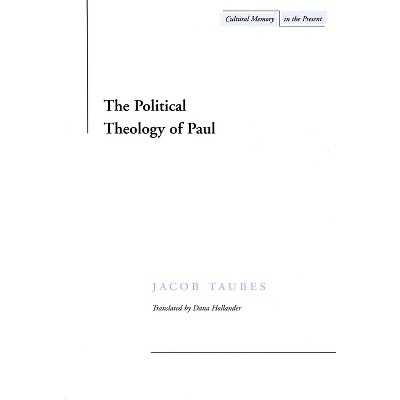Sponsored

Saint Paul - (Cultural Memory in the Present) by Alain Badiou (Paperback)
In Stock
Sponsored
About this item
Highlights
- In this bold and provocative work, French philosopher Alain Badiou proposes a startling reinterpretation of St. Paul.
- About the Author: Alain Badiou holds the Chair of Philosophy at the Ecole Normale Supérieure in Paris.
- 128 Pages
- Religion + Beliefs, Biblical Studies
- Series Name: Cultural Memory in the Present
Description
About the Book
This book revisits and revises some of the most basic concepts of time in the Judeo-Christian tradition, drawing on St. Paul's writings to rethink a new kind of radical faith in truth as an event, as the advent of the incalculable, a modality that remakes the pairing religious/secular.Book Synopsis
In this bold and provocative work, French philosopher Alain Badiou proposes a startling reinterpretation of St. Paul. For Badiou, Paul is neither the venerable saint embalmed by Christian tradition, nor the venomous priest execrated by philosophers like Nietzsche: he is instead a profoundly original and still revolutionary thinker whose invention of Christianity weaves truth and subjectivity together in a way that continues to be relevant for us today.
In this work, Badiou argues that Paul delineates a new figure of the subject: the bearer of a universal truth that simultaneously shatters the strictures of Judaic Law and the conventions of the Greek Logos. Badiou shows that the Pauline figure of the subject still harbors a genuinely revolutionary potential today: the subject is that which refuses to submit to the order of the world as we know it and struggles for a new one instead.
From the Back Cover
In this bold and provocative work, French philosopher Alain Badiou proposes a startling reinterpretation of St. Paul. For Badiou, Paul is neither the venerable saint embalmed by Christian tradition, nor the venomous priest execrated by philosophers like Nietzsche: he is instead a profoundly original and still revolutionary thinker whose invention of Christianity weaves truth and subjectivity together in a way that continues to be relevant for us today.In this work, Badiou argues that Paul delineates a new figure of the subject: the bearer of a universal truth that simultaneously shatters the strictures of Judaic Law and the conventions of the Greek Logos. Badiou shows that the Pauline figure of the subject still harbors a genuinely revolutionary potential today: the subject is that which refuses to submit to the order of the world as we know it and struggles for a new one instead.
Review Quotes
"Badiou introduces the reader to the notion that philosophy stands somewhere beyond the commonplace . . . [and] illustrates the way in which during [St. Paul's] time Paul decided that for God particularities such as nationality or sex are unimportant and therefore everybody is (compared to God) just a human being."--Peter Takac, Human Affairs: Postdisciplinary Humanities & Social Sciences
About the Author
Alain Badiou holds the Chair of Philosophy at the Ecole Normale Supérieure in Paris. Several of his books have been translated into English, including Manifesto for Philosophy (1999), Deleuze: The Clamor of Being (2000) and Ethics: an Essay on the Understanding of Evil (2001).















